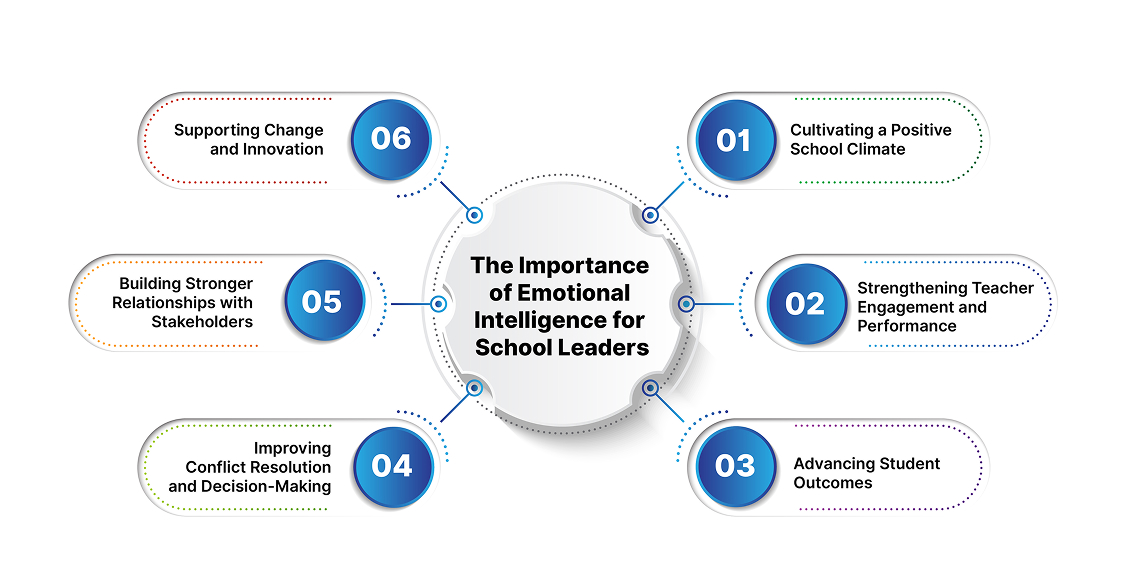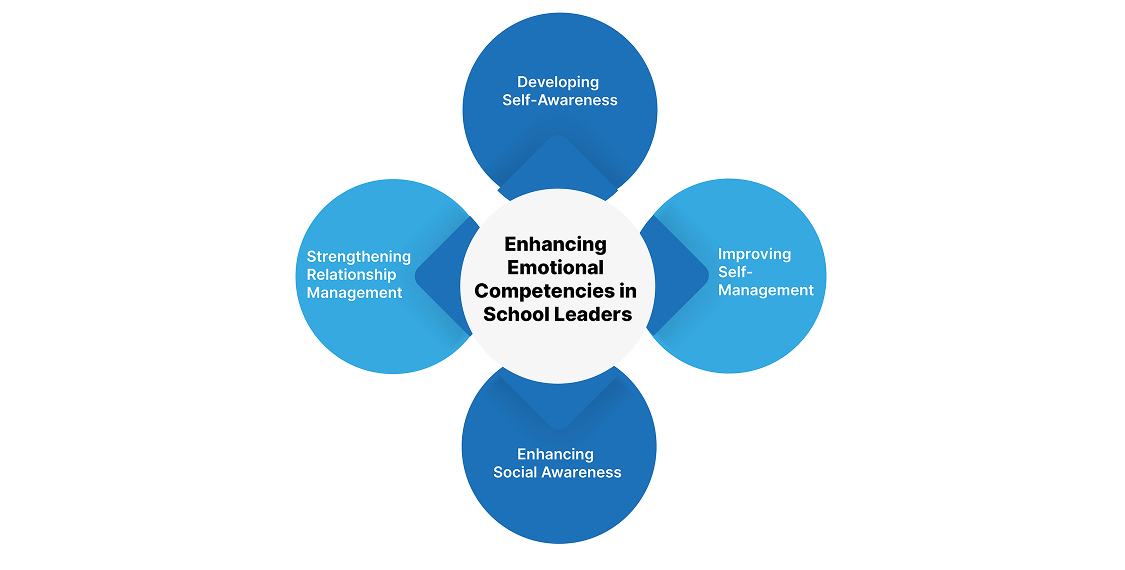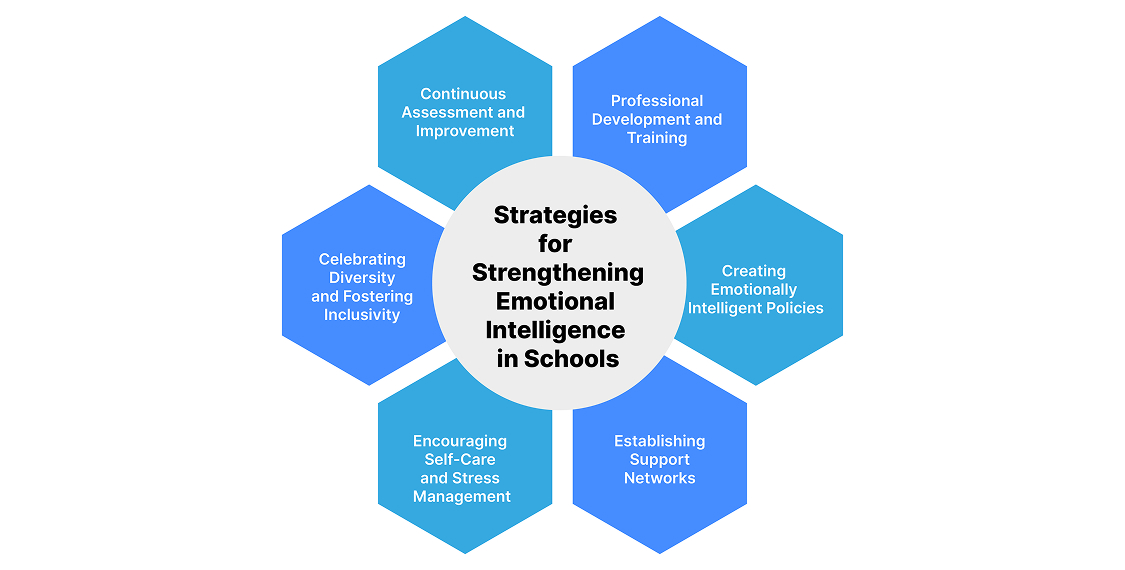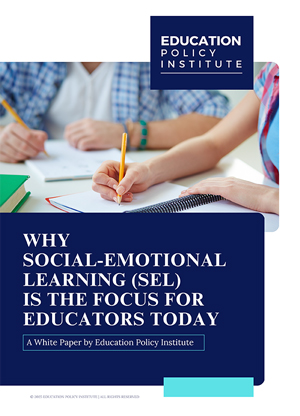Emotional intelligence (EI) has become a crucial quality for school leaders in today’s dynamic educational environment. More than just overseeing academics and operations, effective leadership now demands a deep understanding of emotions—both one’s own and others’. Traits such as self-awareness, empathy, relationship-building, and motivation help leaders build a positive school culture, strengthen communication, and respond thoughtfully to challenges. Especially in the post-pandemic context, leaders who are emotionally tuned in have been better able to support both students and staff.
Unlike older leadership models that focused heavily on control and procedures, today’s successful school leaders embrace emotional insight as a strength. Rather than suppressing emotions, they recognize and use them to guide meaningful decisions and build trust. Emotional intelligence aligns with the same social-emotional skills schools aim to teach students, making it essential for everyone in the school community. In short, EI is no longer an add-on—it is central to leading schools effectively and sustainably.
The Importance of Emotional Intelligence for School Leaders
Emotional intelligence (EI) plays a crucial role in effective educational leadership. It encompasses the ability to understand and manage one’s own emotions while also recognizing and influencing the emotions of others. For school leaders, high emotional intelligence creates stronger relationships, enhances staff performance, and directly contributes to a thriving learning environment.

- 1. Cultivating a Positive School Climate
School leaders who demonstrate emotional intelligence are better equipped to build a nurturing and inclusive school atmosphere. They listen actively, manage conflicts with empathy, and support open communication among teachers, students, and parents. This emotional attunement encourages a culture of mutual respect, trust, and psychological safety—conditions that are fundamental to a healthy and engaging school environment. When stakeholders feel emotionally supported, collaboration improves, and the overall school climate becomes more conducive to both teaching and learning.
- 2. Strengthening Teacher Engagement and Performance
Teachers perform at their best when they feel understood, valued, and professionally supported. Emotionally intelligent leaders recognize the importance of acknowledging teachers’ challenges and achievements, offering timely and constructive feedback, and encouraging continuous development. By showing empathy and understanding in day-to-day interactions, leaders reduce workplace stress and burnout, thereby enhancing morale and job satisfaction. This supportive leadership style not only improves teacher retention but also positively impacts classroom effectiveness.
- 3. Advancing Student Outcomes
The ripple effect of emotionally intelligent leadership reaches students in meaningful ways. When school leaders foster strong teacher morale and a positive climate, students benefit from a more stable and responsive educational setting. Moreover, emotionally intelligent leaders prioritize social-emotional learning (SEL), ensuring that students acquire essential life skills such as empathy, resilience, and responsible decision-making. These competencies not only support academic achievement but also contribute to holistic development, preparing students for future personal and professional success.
- 4. Improving Conflict Resolution and Decision-Making
Emotionally intelligent school leaders are better equipped to manage interpersonal conflicts and make thoughtful, balanced decisions. They approach challenges with composure, consider diverse perspectives, and remain solution-focused. This reduces unnecessary friction among staff and ensures smoother administration of school operations.
- 5. Building Stronger Relationships with Stakeholders
Effective school leadership involves continuous engagement with a range of stakeholders, including parents, education boards, and community members. Leaders with high EI navigate these relationships with tact, emotional awareness, and diplomacy—earning trust, resolving misunderstandings, and maintaining long-term collaboration for the school’s development.
- 6. Supporting Change and Innovation
In times of transition—whether implementing new policies, adapting to technological changes, or responding to crises—emotional intelligence is vital. Leaders who manage their own stress and guide others through uncertainty with empathy are more successful in leading positive, lasting change within their institutions.
Enhancing Emotional Competencies in School Leaders
Building emotional intelligence in school leaders is key to effective leadership, as it enhances their ability to understand and manage emotions in themselves and others. This foundation supports stronger relationships and a healthier school culture.

- Developing Self-Awareness
Self-awareness is the cornerstone of emotional intelligence. For school leaders, developing this quality involves consistently reflecting on their thoughts, feelings, strengths, and areas for growth. Practices like journaling, engaging in mindfulness, and seeking honest feedback from colleagues help leaders gain a clearer understanding of their emotional patterns and behavioral tendencies. When leaders are more self-aware, they can better assess how their emotions influence their decision-making and interactions with others, creating a more thoughtful and grounded leadership approach.
- Improving Self-Management
Once self-awareness is established, effective self-management becomes critical. School leaders frequently face high-stress situations and must be able to regulate their emotional responses constructively. Strategies such as deep breathing exercises, meditation, and taking short mental breaks can help in maintaining composure and clarity during difficult moments. Developing self-management skills enables leaders to remain calm under pressure, respond to challenges with patience, and model emotional control for their staff and students.
- Enhancing Social Awareness
Social awareness involves the ability to understand and empathize with the emotions and perspectives of others. School leaders can build this skill by practicing active listening, observing non-verbal communication, and showing genuine interest in the well-being of their staff and students. Hosting regular meetings, having one-on-one conversations, and maintaining an open-door policy create opportunities for leaders to stay connected with the emotional climate of their school community. By being socially aware, leaders can develop a culture of empathy, trust, and mutual respect.
- Strengthening Relationship Management
Relationship management is essential for maintaining healthy and productive interactions across the school community. Leaders with strong relationship management skills communicate clearly, listen attentively, and handle conflicts with fairness and diplomacy. These skills can be enhanced through continuous professional development, mentorship opportunities, and participation in collaborative team-building activities. By encouraging open communication and resolving issues constructively, emotionally intelligent school leaders build a cohesive and supportive school culture.
Strategies for Strengthening Emotional Intelligence in Schools
Implementing effective strategies to enhance emotional intelligence within schools is essential for creating a supportive and resilient educational community. These approaches empower leaders, staff, and students to develop strong emotional skills that create well-being and collaboration.

- Professional Development and Training
One of the most effective ways to enhance emotional intelligence in schools is through targeted professional development. School leaders should invest in training programs that focus specifically on emotional intelligence competencies, equipping themselves and their staff with practical tools to recognize, understand, and manage emotions in the school setting. Such initiatives not only build personal emotional skills but also promote a school-wide culture of empathy and awareness.
- Creating Emotionally Intelligent Policies
Policies that prioritize emotional well-being can have a profound impact on the school climate. Leaders can implement guidelines that promote mental health awareness, address bullying and harassment, and support a healthy work-life balance. By embedding emotional intelligence into institutional policies, schools create an environment that values emotional safety and nurtures personal growth for both students and staff.
- Establishing Support Networks
Support networks within schools play a crucial role in promoting emotional intelligence. School leaders can initiate mentorship programs, encourage peer-support groups, and provide access to professional counseling services. These structures create safe spaces for individuals to express concerns, seek advice, and develop emotional resilience. Support networks give a sense of belonging and help individuals feel valued and understood.
- Encouraging Self-Care and Stress Management
Recognizing the importance of emotional well-being, emotionally intelligent leaders advocate for self-care practices among staff and students. They lead by example, demonstrating balanced work habits and promoting stress reduction techniques such as mindfulness, exercise, and time management. Leaders can also offer flexible work arrangements when feasible, helping their teams manage workloads and avoid burnout.
- Celebrating Diversity and Fostering Inclusivity
Promoting diversity and inclusivity is a hallmark of emotionally intelligent leadership. School leaders can champion cultural awareness initiatives, challenge biases, and ensure equal opportunities for all members of the school community. By celebrating different backgrounds and perspectives, they build a respectful and inclusive atmosphere where every individual feels valued and empowered.
- Continuous Assessment and Improvement
Emotional intelligence is not a static trait; it requires ongoing reflection and development. School leaders should regularly assess their own EI competencies as well as the broader emotional climate of their school. Gathering feedback from students, staff, and parents enables leaders to identify gaps and areas for improvement. With a commitment to continual learning and adaptation, emotionally intelligent school leaders ensure their schools evolve as supportive, emotionally aware environments.
The Global Fellow Program in School Leadership & Management
The Global Fellow Program in School Leadership & Management by Education Policy Institute (EPI) is a comprehensive, multi-phase learning experience designed for K12 education leaders aiming to excel in today’s dynamic educational landscape. This program integrates online learning, immersive MasterClasses, and self-guided reading, covering vital themes such as global business trends, strategic leadership, instructional excellence, and the effective management of educational institutions. Participants engage in four distinct phases, starting with foundational online courses and pre-reading, advancing through intensive MasterClasses focused on real-world leadership challenges, and concluding with advanced topics in educational innovation and global growth strategies.
Ideal for principals, school heads, edupreneurs, and senior education professionals, this program nurtures both professional growth and practical skills to lead schools with vision, innovation, and financial acumen. If you’re passionate about transforming education and ready to elevate your leadership capabilities, this program offers an unparalleled opportunity to learn from experts, collaborate with peers worldwide, and drive meaningful change in your school and community. Embrace this chance to become a future-ready leader and make a lasting impact in the field of education.
Conclusion
In today’s rapidly changing educational landscape, the role of a school leader extends far beyond administrative tasks and academic oversight. Emotional intelligence has emerged as a vital cornerstone for effective leadership, enabling leaders to connect authentically with their communities and respond thoughtfully to challenges. By continuously developing their emotional competencies, school leaders not only improve their own decision-making and resilience but also inspire trust, collaboration, and innovation throughout their schools. Ultimately, embracing emotional intelligence equips school leaders to create sustainable, nurturing environments where every member—students, staff, and families alike—can flourish.
Latest
Trends blogs
- Mid-Career Education in a Changing Labor Market
- The Next Phase of STEM Education: The Role of Artificial Intelligence in Classroom Curricula
- Education Technology in 2026: Trends Driving the Next Wave of Learning
- Aligning Education with Employability: The Rise of Skill-Centered Learning
Focus blogs
- Research-Driven Education: Strengthening Strategies, Policies, and Classroom Practice
- Professional Certifications for Career Growth: What Students and Young Professionals Need to Know
- Building a High-Impact Center of Excellence: What You Need to Know
- Beyond Graduation: The Importance of Lifelong Learning in Higher Education





